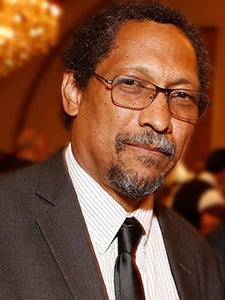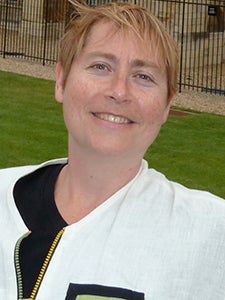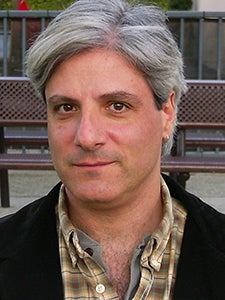USC Dornsife Faculty Receive Guggenheim Fellowships
Three USC Dornsife faculty members have been honored with prestigious Guggenheim Fellowships.
Distinguished Professor of English Percival Everett, Vanessa Schwartz, professor of history and art history, and David Ulin, lecturer in the Master of Professional Writing Program, were among a diverse group of 175 scholars, artists and scientists selected by the John Simon Guggenheim Memorial Foundation on the basis of prior achievement and exceptional promise from a group of more than 3,100 applicants.
Everett said he felt grateful and honored to have won the Guggenheim. “A lot of people apply and a few are selected, and from the list of recipients I am flattered to have been included,” he said. Everett was recently presented with the Presidential Medallion, the university’s highest honor, by USC President C. L. Max Nikias.
The author of 25 books, Everett is currently working on a new novel set in Rhode Island, Paris and El Salvador in 1979, just prior to the Salvadoran Civil War.
“The fellowship will allow me to travel for my research,” Everett said. “I need to be able to speak with some authority about the layout of San Salvador and its surroundings, and talk to people and get a sense of what the city and the American Embassy were like in 1979.”

Percival Everett will use his Guggenheim Fellowship to complete a screenplay and research his next novel. Photo by Steve Cohn.
Everett will also use the Guggenheim to complete a screenplay he is writing for French filmmaker Camille de Casabianca about the celebrated French Navy submarine, the Casabianca, which joined the Free French Forces during World War II and participated in the liberation of Corsica. De Casabianca’s family comes from the village for which the submarine was named.
“Writing novels is really an excuse for me to study something,” said Everett, whose works’ settings range from antiquity to the mythic American West to the contemporary western American landscape and feature such diverse characters as Ulysses, physicians, hydrologists and ball players.
Published by Graywolf Press, his novels include Assumption: A Novel (2011); I Am Not Sidney Poitier (2009); The Water Cure (2007); American Desert (2006) and Wounded (2005), for which he received the PEN USA 2006 Literary Award. For his book Erasure (2001), he earned the American Academy of Arts and Letters’ Academy Award for Literature as well as the Hurston/Wright Legacy Award. His most recent novel is Percival Everett by Virgil Russell (2013).
“I’d like to believe that one wouldn’t be able to see my hand at work from one novel to the next. I think there is an ongoing play with language in all of my works, both with form and structure,” Everett said. “I am less concerned with telling stories than with how stories get told.”
Schwartz’s Guggenheim Fellowship will enable her to concentrate on her book Jet-Age Aesthetics: Media and the Glamour of Motion. She is analyzing how the new cultural experiences in Western Europe and America in the late 1950s to the mid-1960s that made the jet airplane and the constant motion it implied and enabled, beautiful and appealing.
“My book asks what made the rather improbable experience of hurtling through the atmosphere in a metal tube, miles above the ground, seem like one of the most glamorous and exciting ways to live a newfangled life,” said Schwartz, who is director of the Visual Studies Research Institute. A historian of modern visual culture and the author or editor of nine books and journals, she recently won the USC Associates Award for Creativity in Research and Scholarship.

Vanessa Schwartz’s Guggenehim Fellowship will enable her to concentrate on research for her book on the aesthetics of the jet age. Photo courtesy of Vanessa Schwartz.
Her research project focuses on the architects, fine artists, photojournalists, filmmakers and entertainment impresarios who experimented with a powerfully optimistic aestheticization of the technology, motion and mobility that defined the jet age.
“I show that globalization was borne not only out of the increased physical displacement of people and goods, but also — just as importantly — through a new aesthetic that glamorized the associated novel experiences of fluid motion,” she said.
“I am thrilled to be awarded a Guggenheim to support my research and scholarship, not only because of the time it will afford me to do that work full-time, but also because it’s the kind of recognition that is very respected among my peers and also resonates outside academe,” Schwartz said.
Ulin also said he felt honored to have won the award.
“It’s an affirmation, not only of the project for which I applied, but also of the work I’ve done for the last 25 years,” he said. “Many of the writers and artists I admire have been awarded Guggenheims, so that sense of proximity is profound. It’s wonderful, weird and a little overwhelming to be a part of that cohort.”
Ulin, the Los Angeles Times book critic and author or editor of eight books, won for his fiction project Losing My Religion, a memoir about family, faith, assimilation and identity.

David Ulin intends to use his Guggenheim Fellowship to work on a memoir on issues of belonging, identity and heritage. Photo by Noah Ulin.
“These are themes that emerge throughout my writing, and they come together in this book,” Ulin said. “I’ve been circling this project for at least a decade in the form of essays, but it’s only in the last year or two that I’ve really zeroed in. Although zeroed in is not exactly accurate — more that I’ve begun to immerse, to get lost a bit, to see the possibilities and the frame.”
Ulin said he finally worked out how to approach the book a year ago after writing a long essay about his experiences working in a uranium mine in South Texas when he was 18.
“I thought it was a stand-alone, but the more I worked on it, the more I saw broader connections to the themes I want this book to address,” he said. “The issues of belonging, of identity, of the heritage into which we’re born, and the heritage we choose. These will all be a part of the book, which uses the year I was 18, and traveled the country, first from New York to Texas and then to California, as a frame, a lens, a window on those broader concerns.”
Edward Hirsch, president of the Guggenheim Foundation, lauded the 2015 fellows. “These artists and writers, scholars and scientists, represent the best of the best,” he said. “The Guggenheim Foundation has always bet everything on the individual, and we’re thrilled to continue the tradition with this wonderfully talented and diverse group. It’s an honor to be able to support these individuals to do the work they were meant to do.”
Since its establishment in 1925, the foundation has granted more than $325 million in fellowships to almost 18,000 individuals, among them scores of Nobel laureates and poets laureate, as well as winners of the Pulitzer Prize, Fields Medal, and other important, internationally recognized honors.